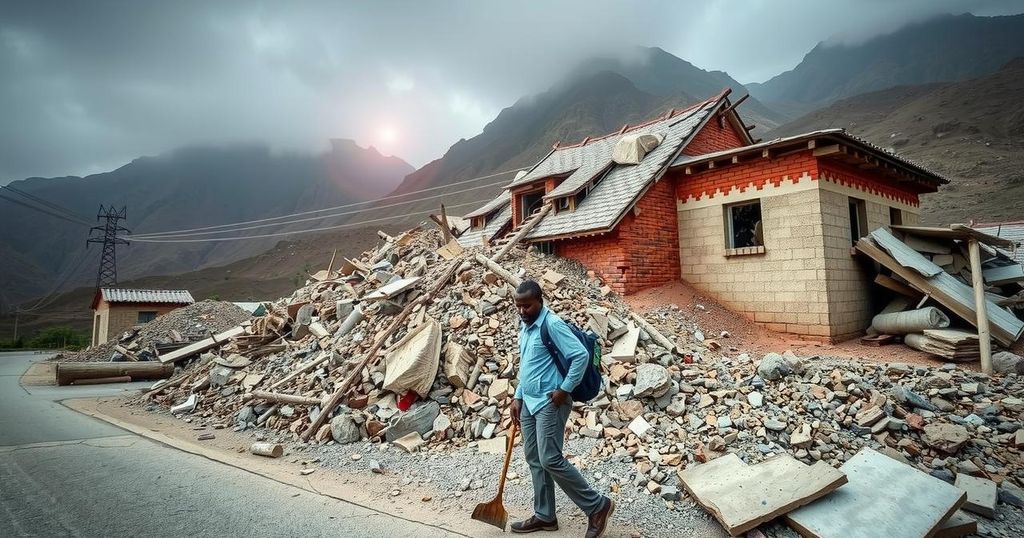Ethiopian Earthquakes: Experts Reassure Safety of the Grand Ethiopian Renaissance Dam

Recent earthquakes in Ethiopia’s Afar region have prompted evacuations and raised concerns about the Grand Ethiopian Renaissance Dam (GERD). Sudanese experts, however, assure that the seismic activity poses no immediate risk to the dam, which is located over 100 kilometers away from the quakes. The dam is designed to endure such seismic events, reaffirming its structural safety despite recent geological activities. Calls for scientific analysis on the GERD’s impact on regional water resources highlight the need for a comprehensive understanding, distancing the discussion from political agendas.
In light of significant seismic activity in Ethiopia’s Afar region, which has led to the evacuation of over 80,000 individuals, experts have addressed concerns regarding the potential impact of these earthquakes on the Grand Ethiopian Renaissance Dam (GERD) and neighboring Sudan. Despite a recent large quake measuring 8.1 and numerous aftershocks, Sudanese geoscientists assert that the risk to the GERD is minimal, as the seismic events occur over 100 kilometers away from the structure, designed specifically to withstand such occurrences.
The most recent earthquake struck at 08:25:54 (UTC) and originated east of Addis Ababa, following a series of quakes with magnitudes reaching up to 5.8 earlier in the week. The response from Ethiopian authorities focused on evacuating those at risk, while Sudanese experts emphasized that the GERD’s foundation is well away from the earthquake-prone zones. Abdelkarim El Amin, a Sudanese engineer, reassured that geological studies conducted prior to the dam’s construction affirm its structural integrity even during seismic disturbances.
El Amin elaborated on concerns over water levels in the GERD reservoir but deemed the possibility of structural damage from recent earthquakes unlikely. He pointed out that the dam’s location, approximately 500 kilometers from the earthquake epicenter, shields it from immediate threats. Furthermore, he noted that dams globally have established resilience in the face of seismic activity, having undergone rigorous geological assessments prior to their construction.
While the potential for disaster from the GERD collapse remains a pressing subject, El Amin characterized it more as a security concern than a technical one. In the event of a significant structural failure, the subsequent flooding could devastate areas surrounding the Blue Nile and affect multiple dams in Sudan, potentially leading to widespread humanitarian and ecological crises. In response, there have been calls for comprehensive studies involving experts from various disciplines to better analyze the implications of the GERD on regional water resources, prioritizing scientific inquiry detached from political influences.
Ethiopia’s Grand Ethiopian Renaissance Dam (GERD) has been a focal point of tension between Ethiopia, Sudan, and Egypt since its inception. The dam is crucial for Ethiopia’s energy needs but has raised concerns about water security downstream, particularly for Sudan and Egypt. The Afar region has experienced significant seismic activity, leading to fears regarding the dam’s stability. However, experts assert that the geological assessments have validated the dam’s capacity to withstand earthquakes, and the current seismic events pose no direct risk to its integrity.
In conclusion, while the recent earthquakes in Ethiopia have raised alarms concerning the Grand Ethiopian Renaissance Dam and its potential repercussions for Sudan and Egypt, experts, including Sudanese geoscientist Abdelkarim El Amin, maintain that the current seismic activity is not a threat to the dam’s structural integrity. Through foundational studies and design considerations, the GERD is equipped to handle seismic disturbances, and ongoing discussions among scientists and officials emphasize the importance of a strategic approach to managing water resources in the Nile Basin. Ensuring a comprehensive understanding of the dam’s environmental impacts remains imperative, free from political constraints.
Original Source: www.dabangasudan.org







